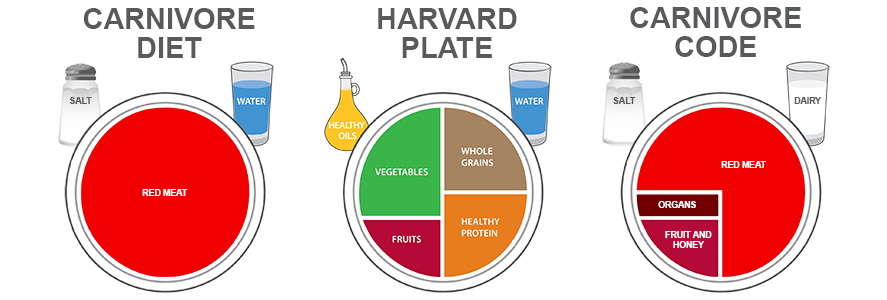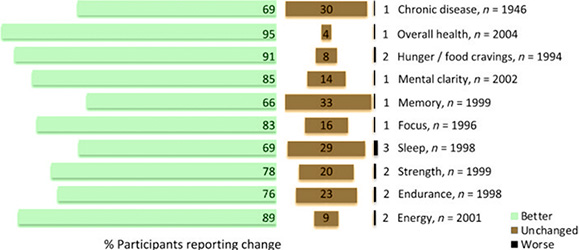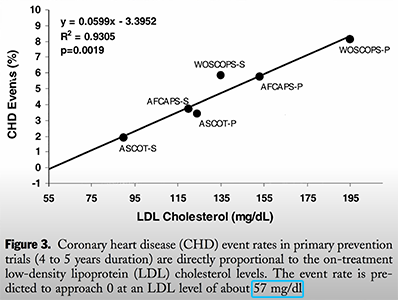I was afraid to learn the carnivore diet works. I’ve been plant-based for years but animal-based diets are getting attention. They aid in weight loss, diabetes prevention, and improved vigor. Despite the claims of improved health, I’m too afraid to try it. It appears dangerous. What is the carnivore diet? How does it work? And why do I avoid it? Well, let’s get into it!
The Carnivore Diet
Shawn Baker’s carnivore diet consists of red meat, salt, and water. It’s a controversial diet that avoids all the plant-based foods I love. Forget Harvard’s Healthy Eating Plate, try a steak plate. Occasional sides of eggs, dairy, seafood, and organ meats are acceptable. [1]

Paul Saladino’s carnivore code is similar. Lots of meat. Organs should be a focus though. Liver being the primary but don’t forget hearts, testicles, and bone marrow. That’s where the micronutrients are. While he agrees with popular science on fruit consumption, he also touts honey, raw milk, and salt. These diets have starred on the Joe Rogan show and have been adopted by popular celebrities. Partly because they work. [2]
How It Works
I scoured PubMed to understand how. But a search for “carnivore diet” yields only one relevant result [3]. A social media survey of 2,000 people [4]. Participants reported high levels of satisfaction and improvements in overall health, well-being, and various medical conditions. Plus, they lost weight. But how does it work?

First, the average American’s diet is horrible. Any other diet will work when you stick to it [5]. The carnivore diet is no exception. Second, improving food quality matters. Grass-fed beef is better than a conventional burger [6]. My sister would benefit from organic beef liver over her sugar topped rice crispies. And third, an elimination diet can have short-term benefits. Not eating whole grains may relieve an unknown gluten intolerance. Eliminating beans may alleviate legume sensitivities. These are the obvious reasons it works. Beyond this, it is abundantly clear that higher-quality research is required [7].
Risks of Going Carnivore
Despite the benefits, I can’t imagine going carnivore. Meat contains saturated fat. Saturated fat raises LDL cholesterol [8]. And high LDL causes heart disease [9]. Why would I want to raise my risk for our number one killer? Paul Saladino’s LDL is 553 mg/DL [14]. Ten times higher than mine [15]. Ten times higher than the optimal range [10]. That worries me.

Regarding mortality, considerable evidence shows plant-based proteins outperform meat-based proteins [11]. Plant-based fat beats meat-based fat [12]. And optimal carbohydrates should be 50%-55% of total calories [12]. Meat offers zero. Americans already consume too much salt and too little fiber [13]. A carnivore diet amplifies these issues. It’s a prescription for the opposite of all well-established health guidelines. It’s hard for me to conclude that all these studies are incorrect.
Maybe a high LDL doesn’t matter with low insulin sensitivity? Maybe the diet’s nutrient deficiencies don’t matter if the established RDAs are incorrect? Maybe all the animal-based studies aren’t carnivore enough? Maybe a diversity of fibrous plants is dangerous for human health? Only more scientific research will tell. Right now, we have nothing but anecdotes. Assuming the standard American diet is a 1-star diet, I give this:
Final Thoughts
It’s no surprise the carnivore diet works. Every diet works. But abundant research on the mechanisms is required. Chronic diseases form after 10, 20, 30 years. That latency is significant. It’ll be a while before we have any high-quality long-term studies. This makes it hard to have any confidence in it today. Especially as evidence for a variety of whole plant foods is mounting. And if I’m betting my life on the diet race… which I am, I’d rather wager my chips with the odds-on favorite than the unconvincing long shot. These are my latest habits for health excellence.

